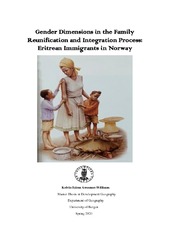| dc.contributor.author | Awoonor Williams, Kelvin Edem | |
| dc.date.accessioned | 2020-06-16T04:31:30Z | |
| dc.date.available | 2020-06-16T04:31:30Z | |
| dc.date.issued | 2020-06-16 | |
| dc.date.submitted | 2020-06-15T22:00:43Z | |
| dc.identifier.uri | https://hdl.handle.net/1956/22605 | |
| dc.description.abstract | This thesis presents a feminist approach towards understanding gender in the migration and integration process. It examines the dynamics involved in Eritrean families’ gender relations after they migrate to Norway and how gender norms in Norwegian society influence their role expectations and social practices. Moreover, the thesis explores how Eritrean immigrants’ gender ideologies influence their process of integration, whether women and men are able to renegotiate gender roles in the household, enabling them to participate outside the home thereby eliciting changes to power relations in the household. Finally, the thesis analyses how gender interacts with other social identities that Eritrean immigrants (particularly women) possess and how it influences their integration process. This thesis required conducting three months of fieldwork in Bergen, Norway in 2019. The study follows an ethnographic methodological approach to understand immigrants’ experiences. The empirical findings from the fieldwork have been complemented by theoretical approaches such as the gender concept in feminist theory, social integration, empowerment, and intersectionality. These theories used to analyze the empirical data has enabled the contextual understanding of gender relations within migration and integration processes, investigating the main research question: In what ways are gender relations in Eritrean immigrant households influenced when they settle in the Norwegian society? The thesis argues that gender relations for Eritrean immigrants are influenced by their existing gender ideologies which impact their role performance in the household. Eritrean immigrant men and women face challenges in renegotiating domestic roles and parental labour thus leading to gender differences in their division of household labour and impacting on women’s participation in the public sphere in terms of education and paid work. Opportunities for women in Norwegian society leads to their achieving various levels of empowerment, influencing their position and decision-making process in the household. Welfare conditions in the Norwegian society support Eritrean women’s empowerment as well as engendering their dependency in the household. Access to resources is influenced by gender relations between women and men which results in gender differences in both material and non-material resources. | en_US |
| dc.language.iso | eng | |
| dc.publisher | The University of Bergen | |
| dc.rights | Copyright the Author. All rights reserved | |
| dc.title | Gender Dimensions in the family reunification and integration process: Eritrean immigrants in Norway | |
| dc.type | Master thesis | en_US |
| dc.date.updated | 2020-06-15T22:00:43Z | |
| dc.rights.holder | Copyright the Author. All rights reserved | en_US |
| dc.description.degree | Master's Thesis in Geography | |
| dc.description.localcode | GEO350 | |
| dc.description.localcode | MASV-MEHA | |
| dc.description.localcode | MASV-GEOG | |
| dc.description.localcode | MASV-PHYG | |
| dc.description.localcode | MPGEOGR | |
| dc.subject.nus | 733111 | |
| fs.subjectcode | GEO350 | |
| fs.unitcode | 15-41-0 | |
